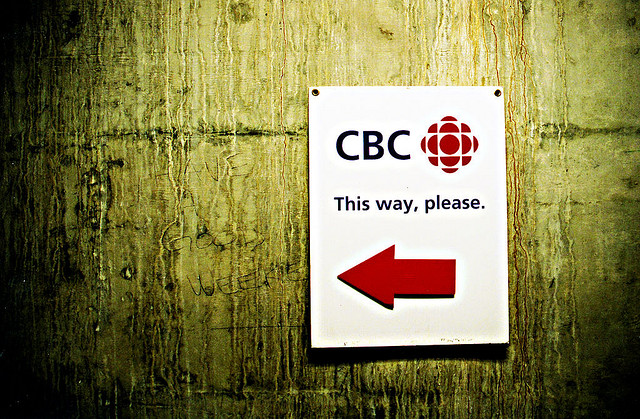A few days before black clouds descended yet again over the CBC, I was editing some compelling audio for The Sunday Edition, a panel discussion about the future of public broadcasting. One voice stood out. A former BBC executive named Mark Damazer was uttering things through my headphones that I could never imagine emerging from the mouth of anyone in CBC management.
He spoke in an unapologetic, forthright tone, describing public broadcasting as “an ideology, an act of political will.” It must be dedicated, he said, to “making all the good programs popular and all the popular programs good.” Then Damazer threw down the gauntlet: we must believe in it and invest in it or simply kill it.
“Keeping a kernel of public service broadcasting, but depriving it of weight and energy by endlessly hacking away at its funding … is in some senses worse than abolishing it,” he said, “because it allows politicians and you, the public, and an entire society to believe in the illusion of a civic space without actually having the substance of one.”
Well, amen to that.
Endless hacking away at the CBC’s budget has been going on for decades through a succession of both Liberal and Conservative governments. But this time, management is making a point of saying, in so many words, that it’s our fault, it’s not their fault. We’ve been told our financial woes are due to a number of internal pressures — such as lower-than-expected ad revenues and the loss of NHL broadcast rights.
None of this would be an issue if the CBC had a funding model like the BBC’s. In Britain, the public broadcaster is not dependent on the whims of the party in power; and there is no revenue from advertising because there are no ads. Instead, every household with a television pays a licence fee for public broadcasting (about $270 a year/ 74¢ a day). This means the Beeb knows how much revenue it will have year after year. It also means that Brits would choke on their crumpets if they felt they weren’t getting their money’s worth.
Public funding of the CBC costs each of us about $34 a year (9¢ a day) for a much more demanding range of services than in Britain: radio, television and online programming in French and English, plus eight aboriginal languages across the North; not to mention the challenges of our geography. More money would not result overnight in better programming, but it sure would help. It might also change the culture of fear in the management corridors of the CBC.
Radio is the Mother Corp’s favoured child. We are held up to our brothers and sisters in English Television as a shining example of how to be distinctive and how to do things right; but we don’t always feel deserving. CBC Radio fans are loyal to a fault, maintaining our consistently high ratings; but many producers believe, as I do, that the quality of programming in “the senior service” is not what it used to be and we hear from listeners who agree.
We are not immune to budget cuts. Before walking into those gloomy all-staff meetings, we can recite the litany of clichés we are about to hear as readily as our TV colleagues: it is time to rethink, reinvent, re-envision, re-imagine; be leaner, more agile, more adaptable; do more with less. The “Town Hall” gathering last week was no different. A grand total of 657 people are about to lose their jobs through this round, budgets will be slashed and those who stay will try, as always, to do more with less.
There was one warm round of applause at that meeting. It was for a radio colleague who asked Hubert Lacroix why we are not pressing all the political parties to tell us where they stand on the principle of having a public broadcaster.
The CBC President sidestepped the question. Perhaps he doesn’t want to press because he’s afraid of the answer.
I want to know and I’m not alone.
If, as Mark Damazer put it, there is no longer the political will to have a public broadcaster, it would be more merciful to put a knife through the Mother Corp’s heart than to slash her wrists and leave her to bleed to death.
Talin Vartanian has been working at CBC Radio for more than 35 years on programs such as Morningside, This Morning, As It Happens and Canada Reads. She is currently a producer at The Sunday Edition. This column is a personal opinion and does not reflect the views of the CBC.
Photo: flickr/Kris Krug



